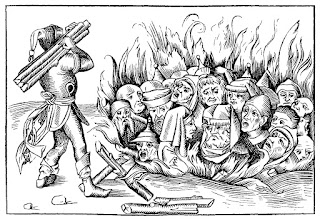Why Seek Refuge in a Synagogue?
To be analytical about a very emotional subject, the different cases of synagogue massacres can be groups into several categories:
- Jews are attacked in a synagogue during a regular service. This is (thankfully?) the only situation that still takes place post-Holocaust.
- Jews are forced to gather in the synagogue and then executed
- Jews flee to the synagogue for refuge and are nonetheless overrun.
Group 3 seems the most curious situation. Despite generations of stories, despite the chance to chose a low-key hiding spot, Jews have persisted in running to the synagogue for protection. Why is this so? I have a few suggestions:
- The synagogue truly provided a good refuge
- The synagogue was generally a better-constructed building than most residential hovels, and could be better defended.
- The synagogues of some towns were made of stone and were thus more fire-resistant.
- The synagogue was a convenient place of congregation
- Jews could potentially organize a resistance if they gathered together, while individuals had little chance of repelling attacks
- Jews could appeal to local authorities for protection. This happened a lot, and with reasonable success. An individual peasant-Jew had no chance of contacting the local magistrate or town leaders, but might believe he would find the community leaders in the synagogue and that they would have the connections to arrange for protection. The same might be true for gathering ransom money.
- Protection in numbers - a large group together might mean that invaders would attack other Jews, giving an individual a shot at escape. (Call this the Jacob defense.) If 30 Jewish women are in one place, it will not necessarily be your daughter who is raped.
- Spiritual Protection
- The synagogue is the ideal place to beseech God for assistance. Pious Jews wishing to appeal to a Higher Authority may choose to be in the synagogue.
- The synagogue is the ideal place to offer oneself up as a martyr. At times in the Middle Ages this was trendy.
- The town Rabbi may be present
- He may help coordinate prayers
- As a Tzaddik, his very presence may provide protection for everyone else. One can see this in a story that Sergey Kravtsov recounts about the synagogue of Alik and the Rabbi David Ha-Levi Segal.
- The synagogue itself may provide miraculous protection. There is evidence that Jews believed this to be the case.
- Haya Bar Itzhak (Jewish Poland - Legends of Origin) lists legends of synagogues saved from fires, often when birds extinguish the fire by beating their wings. "When the first fire broke out in Gorlicz, the entire city burned down. People ran for their lives to the open country; everything was food for the flames. When the fire got close to the old House of Study, the Jews were seized with a terrible dread and despair. But when the flames came very close indeed, a flock of white doves suddenly appeared in the sky alongside the House of Study and the beating of their wings kept the fire from reaching the building."
- The same author records other stories where the synagogue building was miraculously saved. In Ostra, the invading Russian army in 1792 thought that the synagogue would be the tallest building in town, and thus ended up attacking the wrong structure.
- Nazi attempts to blow up synagogues were sometimes said to require inordinate amounts of explosives.
- The Abuhav synagogue in Safed was said to miraculous have trans-located from Spain. (The Times of Israel)
Thus is can be said that Jews had ample reasons for heading to the synagogue when trouble arose, be it practical or metaphysical. And for all the cases where Jews were killed in synagogues, there are at least as many instances when they were saved.


Comments
Post a Comment